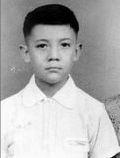Chiang Hsiao-wu (Chinese: 蔣孝武; pinyin: Jiǎng Xiàowǔ; also known as Alex Chiang; April 25, 1945 – July 1, 1991) was the second son of Chiang Ching-kuo, the President of the Republic of China in Taiwan from 1978 to 1988. His mother is Faina Ipatyevna Vakhreva, also known as Chiang Fang-liang. He had one older brother, Hsiao-wen, one older sister, Hsiao-chang, and one younger brother, Hsiao-yung. He also had two half-brothers, Winston Chang and John Chiang, with whom he shared the same father.
Alex Chiang Hsiao-wu | |
|---|---|
| 蔣孝武 | |
 | |
| ROC Representative to Japan | |
| In office January 1990[1] – June 1991 | |
| Succeeded by | Hsu Shui-teh |
| Personal details | |
| Born | 25 April 1945 Zhejiang, Republic of China[1] |
| Died | 1 July 1991 (aged 46)[2] Taipei Veterans General Hospital, Taipei, Taiwan |
| Nationality | Republic of China |
| Political party | Kuomintang |
| Spouse | Michelle Chiang Tsai Hui-mei[3] |
| Children | Alexandra Chiang Yo-lan, Johnathan Chiang Yo-sung[3][4] |
| Alma mater | Chinese Culture University Munich School of Political Science[5] |
He was president of the state-run Broadcasting Corporation of China from 1980 to 1986, and later headed the Republic of China mission to Singapore for two years,[6] starting in April 1986 as the deputy trade representative[7] before being transferred to the mission to Japan in 1990.[8][9] In a December 1985 speech, Hsiao-wu's father Chiang Ching-kuo declared ″If someone asks me whether anyone in my family would run for the next presidential term, my reply is, ′It can't be and it won't be.′″[10][11][12] Prior to the speech, Chiang Hsiao-wu was the only one of Chiang Ching-kuo's sons mentioned as a potential successor.[7]
He died at the age of 46, on July 1, 1991, at the Taipei Veterans General Hospital in Taiwan as a result of congestive heart failure brought on by chronic inflammation of the pancreas.[2][8][13] He was survived by his wife and two children.[2][3]
References
edit- ^ a b O'Neill, Mark (August 5, 1990). "Unofficial Taiwan Ambassador Carries Heavy Burden of History in Japanese Capital". Los Angeles Times. Los Angeles, California. Reuters. Retrieved November 7, 2014.
- ^ a b c "Chiang Hsiao-wu; Taiwan Diplomat, 46". The New York Times. New York, New York. AP. July 3, 1991. Retrieved November 7, 2014.
- ^ a b c "Declaration of Eric Wakin" (PDF). hoover.org. The Hoover Institution. January 8, 2014. Retrieved November 7, 2014.
- ^ Taylor, Jay (November 14, 2000). The Generalissimo's Son: Chiang Ching-kuo and the Revolutions in China and Taiwan. Cambridge, Massachusetts: Harvard University Press. p. 318. ISBN 978-0674002876. Retrieved November 7, 2014.
- ^ O'Neill, Mark (5 August 1990). "Unofficial Taiwan Ambassador Carries Heavy Burden of History in Japanese Capital". Los Angeles Times. Retrieved 14 April 2020.
- ^ "Singapore PM All Smiles In ROC". Taiwan Journal (Ministry of Foreign Affairs). Taipei, Taiwan. February 23, 1989. Archived from the original on 2014-11-07. Retrieved November 7, 2014.
- ^ a b Brown, Phil (12 June 1986). "Aging Taiwan President Prepares To End Dynasty, Talks With Foes". Schenectady Gazette. AP. Retrieved 19 May 2016.
- ^ a b "Chiang Hsiao-wu; Grandson of Chiang Kai-shek". Los Angeles Times. Los Angeles, California. July 4, 1991. Retrieved November 7, 2014.
- ^ "From Presidential Stock; Tokyo Press Welcomes Chiang". Taiwan Journal (Ministry of Foreign Affairs). Taipei, Taiwan. January 15, 1990. Archived from the original on 2014-11-07. Retrieved November 7, 2014.
- ^ Jacobs, J. Bruce (2012). "Three: The Lee Teng-Hui presidency to early 1996". Democratizing Taiwan. Leiden, The Netherlands: Koninklijke Brill NV. p. 72. ISBN 978-90-04-22154-3. Retrieved 19 May 2016.
On February 13, 1990 a group of National Assembly members proposed Lin Yang-kang for president and the following day Chiang Wego denied that his brother Chiang Ching-kuo had said, ″Members of the Chiang family cannot and will not run for president.″ Footnote 19: [...] Chiang Ching-kuo made this statement on December 25, 1985.
- ^ "Taiwan chief rules out chance family member will succeed him". The New York Times. AP. 26 December 1985. Retrieved 19 May 2016.
- ^ Chiang Ching-kuo (25 December 1985). Constitution to Determine His Successor (Speech). Constitution Day. Taipei, Taiwan. Archived from the original on 8 August 2016. Retrieved 19 May 2016.
- ^ "SON OF LATE PRESIDENT CHIANG DIES". AP News. July 1, 1991. Retrieved November 7, 2014.